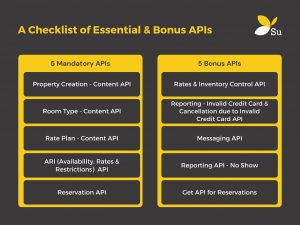In today’s world of property management systems, different computer systems need to talk to each other smoothly.
That’s where APIs come in. They are like translators and mediators, helping systems understand each other’s language. This is super important for Property Management Systems (PMS), which are like the brains of a property’s tech setup.
As you are aware, without APIs the PMS would not connect to all the other tools it needs to run smoothly, like booking engines or payment gateways. It would be like trying to have a conversation in a language you do not understand.
There are different types of APIs, each serving a specific purpose. Some are like wide-open doors, letting anyone use them (Open APIs). Others are more like VIP entrances, only for trusted partners (Partner APIs). Then, there are ones used only within a company (Private APIs), and some that combine different tools to make things faster (Composite APIs).
REST (Representational State Transfer) and SOAP (Simple Object Access Protocol) are two such basic approaches for building APIs. REST relies on HTTP protocols for communication, emphasizing stateless interactions and employing standard HTTP methods like GET, POST, PUT, and DELETE. Data exchange in RESTful APIs commonly occurs in JSON (JavaScript Object Notation) or XML (eXtensible Markup Language) formats. Conversely, SOAP, primarily based on XML, adheres to a more rigid messaging structure, often operating over various protocols including HTTP.
Su, having previously operated on XML, has transitioned to JSON to operate efficiently for connectivity. This shift is attributed to JSON’s lightweight and easy to differentiate nature, facilitating enhanced efficiency and smoother communication for Su’s API operations.
So, in a nutshell, APIs are like the secret sauce that keeps everything running smoothly in the hospitality world. They help systems understand each other, prevent mistakes, and make sure PMS’ get the right info at the right time. In order to showcase the right API usage for the associated functionalities, we have categorized and enlisted certain APIs for your private label –

5 Mandatory APIs
In addition to understanding the importance of APIs in the hospitality industry, there are certain APIs that are crucial for setting up and managing a property effectively. These APIs ensure that the property is seamlessly integrated into the platform, offering a fully API-driven approach to operations.
1) Property Creation – Content API:
- Allows for the creation, updating, and removal of property information.
- Supports content such as images, amenities, descriptions, address, GPS coordinates, and more.
2) Room Type – Content API:
- Facilitates the creation, updating, and deactivation of different room types.
3) Rate Plan – Content API:
- Enables the creation, updating, and deactivation of rate plans for rooms.
4) ARI (Availability, Rates & Restrictions) API:
Allows for the real-time updating of availability, rates, and restrictions for both rooms and rate plans.
5) Reservation API:
Offers flexibility in retrieving bookings through Pull, Push, or Hybrid mode, giving you control over how booking data is managed.
These APIs are indispensable for property management, providing the necessary tools to efficiently manage property details, room types, rates, availability, and reservations.
5 Bonus APIs
In addition to the essential APIs for property management, there are bonus APIs available to maximize the capabilities of your dashboard and streamline operations further.
1) Rates & Inventory Control API:
Allows partners to customize specific inventory, rates, and restrictions for individual rooms or rates connected to Online Travel Agencies (OTAs).
2) Reporting – Invalid Credit Card & Cancellation due to Invalid Credit Card API:
- Marks and notifies when a credit card received from a guest is invalid.
- Provides the capability to cancel bookings after a credit card is marked invalid.
3) Messaging API:
Establishes connectivity between guests and hosts, enabling direct communication via messaging services and a unified mailbox.
4) Reporting API – No Show:
Acknowledges OTAs to mark a booking as “No Show,” providing insights into guest behavior.
5) Get API for Reservations:
- Pulls basic data of existing bookings based on booking date or range.
- Returns data including booking ID, status, check-in/out dates, and channel ID.
Bonus Feature: Failed Update API:
Saves time by automatically detecting and reporting failed updates, eliminating the need for manual checking in the extranet.
Leveraging these APIs can further ease up and smoothen the property management operations. In conclusion, as technology continues to evolve, the role of APIs will remain pivotal in shaping the future of hospitality, driving innovation, and fostering a more connected and efficient ecosystem for PMS’ worldwide, with one objective in mind: Making the user’s life ever easier!
